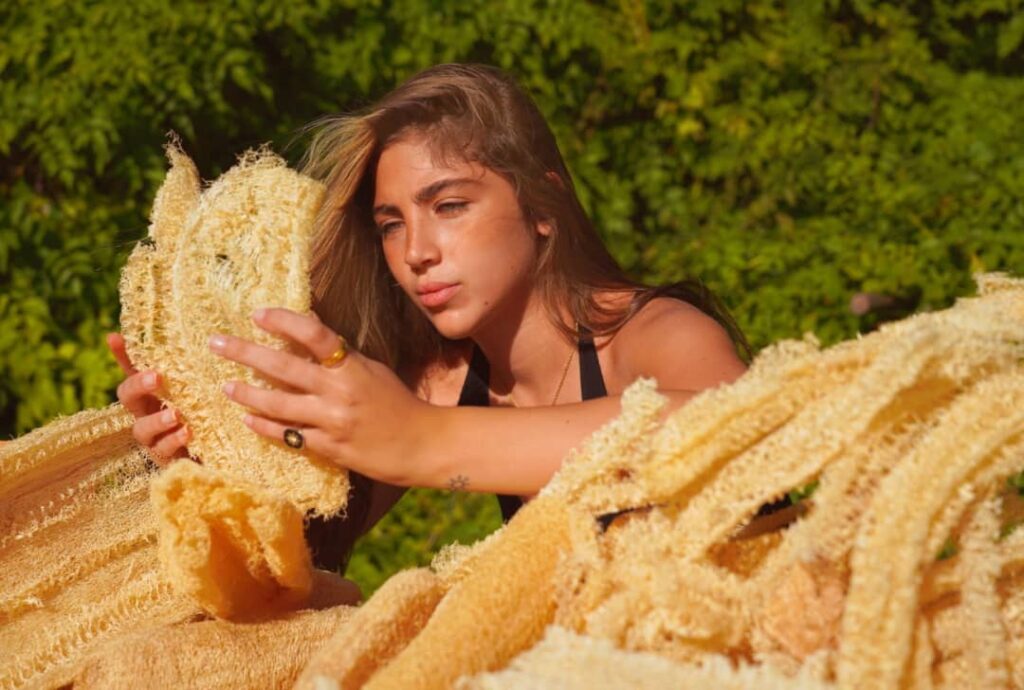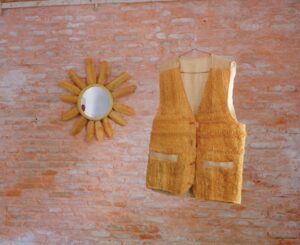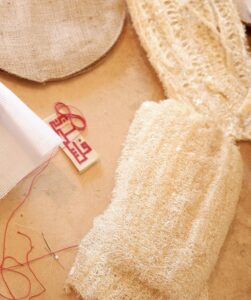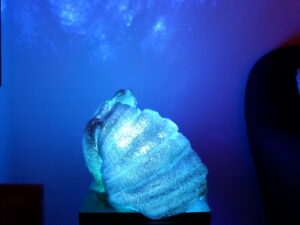
- ARAB NEWS
- 06 Jul 2025

DUBAI: In the bustling world of fashion, where creativity meets consciousness, Lebanese designer Noor Taan succeeds in seamlessly blending sustainable practices with avant-garde design.
Taan’s unique approach, which is part of her brand ‘Life of Loofah,’ involves incorporating loofahs into clothing, lamps and more, creating a harmonious fusion of eco-friendliness and style.
Taan’s journey towards sustainability began with a desire to challenge the norms of the fashion industry. Instead of traditional fabrics, she turned to loofahs—nature’s scrubbers—as a versatile and unexpected material. The result is a collection that not only catches the eye but also sparks conversations about the possibilities of sustainable fashion.

“When I was in Lebanon, I was in the car with my dad when we passed by a street stall selling loofahs,” Taan explained. “I told my dad to stop the car. I got down and wanted to touch them and feel them, since then, I’ve been obsessed.”
Taan told Arab News Japan she went home with all the loofahs and began exploring.
Throughout her research and exploration of the loofah, she discovered that they were part of the cucumber family.
“At an early stage, it looks like a zucchini and the way you peel it is like corn. And it becomes super dry,” she explained.
Taan spent a year in New York working on a graphic design master’s degree, where she continued to explore loofahs and experimented with people’s reactions.
For her thesis, Taan created a cocoon-like shape made from 500 pieces of natural loofah. “I wanted to make it all about natural materials, and all about smell, touch and the experience of it.”
“I mapped out 2000 people’s reaction to the womb-like art piece,” she said. “The concept was to allow humans to enter and exit the cocoon and see what happens. Nobody out of the 2000 people realized it was the loofah we use in the shower.”
Taan also spent a few months at Tokyo’s School of Media Design at Keio University, where she said the impact of Tokyo and Kyoto truly inspired her. Immersed in Japanese culture, she absorbed the principles of precision, minimalism, and reverence for nature—a foundation that deeply influences her work today.
With the Japanese influence in mind, Taan designed the kaftan kimono, which incorporates loofahs as part of the lapel.
“Experimenting with loofahs, I discovered that if you clean them out, iron them, they become super thin like paper, but so strong,” Taan told Arab News Japan. “Then I started to stitch, and incorporate them into clothes, taking advantage of the different textures you get from the loofahs.”
Taan arrived in Dubai during the infamous Dubai Design Week 2022, and it was her first time showcasing her work in the GCC region and the Middle East. She plans to officially set up her brand Life of Loofah in Dubai.
During her time in Japan, Taan explained that it was a stark difference from the culture she is used to.
“In Japan, there is a sense of collectiveness and teamwork that I admired. I loved the discipline and respect Japanese people had for teamwork. It was powerful to talk about our work as one,” she said.
Taan’s designs are not specific to one region in the world. She also created works that were inspired from her home country and neighboring countries.
She collaborated with Palestinian refugees in Lebanon to design bags and clutches that incorporate both loofahs and traditional Palestinian embroidery.

Taan’s designs are not confined to the realm of clothing alone. Her innovative spirit extends to lighting, where she transforms loofahs into lamps. The soft glow emitted through the loofah’s natural fibers creates an ambiance that reflects both tranquility and modernity—a testament to her ability to seamlessly blend traditional and contemporary elements.
As consumers increasingly seek ethical and sustainable options, Taan stands at the forefront of a new wave in fashion.

With loofahs as her canvas and Japan as her muse, Taan is reshaping the narrative of fashion, proving that style and sustainability can coexist harmoniously.